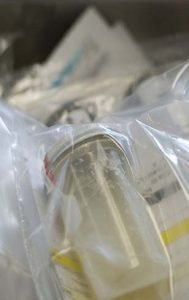Ron Hines DVM PhD
 See What Normal Blood & Urine Values Are
See What Normal Blood & Urine Values Are
 Causes Of Most Abnormal Blood & Urine Tests
Causes Of Most Abnormal Blood & Urine Tests

About The Creatinine In Your Dog And Cat’s Urine
The creatinine in your dog and cat’s urine, as well as in your urine, originates from the same sources (chiefly a byproduct of muscle metabolism – with some contribution from the animal proteins we may eat). Creatinine is not the same thing as creatine. The same creatinine first circulates in the blood. It is the kidney’s job to filter it out. (read here)
The presence of creatinine in your dog or cat’s urine does not, in itself, tell your veterinarian very much. It is a normal constituent of urine. Urine creatinine level’s chief value is that unlike many other urine components (such as water, cortisol and protein) normal kidneys excrete creatinine at a rather constant rate throughout the day. (read here) So the creatinine level in your pet’s urine is often compared to other urine constituents to decide if those other constituent levels are higher or lower than they ought to be. Creatinine can be used as a standard benchmark or used in a ratio to which other urine components are compared. Those other components tend to fluctuate more with changes in your pet’s urine concentration throughout the day, rather than give an accurate estimate of their average blood values. Several urine assays – like urine cortisol:creatinine ratio, a rule-out test for Cushing’s disease (or for illegal drug screening in humans) rely on this rather steady rate of creatinine urinary excretion.
When your veterinarian is attempting to evaluate the condition of your dog or cat’s kidneys, he/she is considerably more likely to examine your pet’s blood creatinine level than its urine creatinine level and to look at other urine parameters such as urine specific gravity or the urine’s albumen protein content. Kidneys with reduced function often leak protein into the pet’s urine that healthy kidneys do not allow to pass.
Certain antibiotics (e.g. cephalosporins, gentamycin, trimethoprim-sulfa) or antacids (such as cimetidine) can result in incorrect urine creatinine and creatinine ratios.
DxMe
You are on the Vetspace animal health website
Visiting the products that you see displayed on this website help pay the cost of keeping these articles on the Internet.


